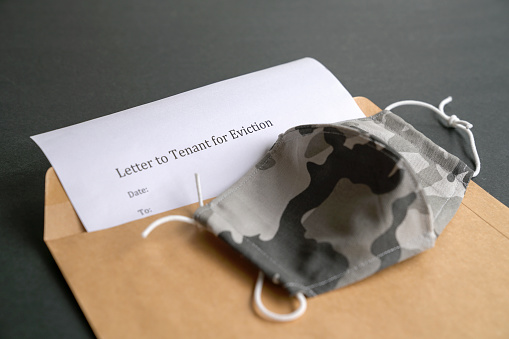The Centers for Disease Control and Prevention (CDC) announced on Tuesday, August 3, that it will be extending the federal eviction moratorium through October 3, 2021. This announcement was made after the previous moratorium ended on July 31.
Like many rental housing professionals, you likely have questions about what’s changed with the latest reiteration of the moratorium and how it will affect your properties. Here’s everything you need to know about the latest CDC eviction moratorium extension, who’s protected, and how to access federal rental assistance for help.
An Overview of the Latest CDC Eviction Moratorium Extension
Like the previous moratorium, the latest CDC eviction moratorium extension prohibits evictions involving tenants who are unable to pay their rent, late rent fees, penalties, or interest as long as they meet the eviction protection requirements. The purpose of extending the moratorium is to allow more time for landlords and renters to apply for and receive funds from the federal Emergency Rental Assistance program.
This latest CDC order is intended to “temporarily halt evictions in the hardest-hit areas.” This means that the moratorium will only be effective in counties that have a “substantial” or “high” level of COVID-19 transmission. According to the CDC, a “substantial” transmission rate is considered more than 50 new COVID-19 cases per 100,000 people within the past seven days; a “high” transmission rate is considered more than 100 new cases per 100,000 people within the past seven days. Unfortunately, this currently includes approximately 80% of the counties in the U.S.
Once an individual county’s transmission levels are below the “substantial” rating for 14 consecutive days, the moratorium will be lifted in that area. However, if there’s an increase again in that county, the moratorium will be reinstated.
Keep in mind that the moratorium extension isn’t applicable for areas that already have the same or greater levels of COVID-19 eviction protections in place. It also doesn’t prevent local or state governments from enacting additional eviction protections.
The new extension also covers evictions that were filed during the lapse between the previous moratorium and the current one (August 1-3). However, it does not provide protections for evictions that were finalized during that period.
Who is Protected Under the Latest Extension?
The latest moratorium extension will cover an estimated 90% of renters, according to Senator Chuck Schumer, and will include the $46 billion in emergency rental relief allocated by Congress.
Like the previous moratorium, tenants must provide their landlords with a signed declaration and meet the following requirements to qualify for eviction protection:
- The tenant has used their best efforts to obtain government assistance for rent or housing.
- The tenant either earned less than $99,000 (or $198,000 if filed jointly) in 2020 or expect to earn no more than that amount in 2021, or they weren’t required to provide income to the IRS in 2020, or they received a stimulus check during the pandemic.
- The tenant is unable to pay their monthly rent in full due to loss of a job or income, or a decrease in income or hours because of the pandemic, or they face extraordinary out-of-pocket medical expenses.
- The tenant is continuing to make partial rent payments as close to the full amount as their circumstances permit.
- The tenant would be homeless or would need to move into close living conditions (ex: moving in with friends, family, or to a shelter) if they were evicted.
- The tenant lives in a county with a “substantial 9” or “high 10” COVID-19 transmission rating according to the CDC.
Evictions are currently being monitored by the Federal Trade Commission (FTC) and the Consumer Financial Protection Bureau (CFPB) and will be enforced with a penalty of up to $100,000, one year in prison, or both. If the eviction somehow resulted in a tenant’s death, the fee will be increased to up to $250,000, a year in prison, or both. If a housing company or organization violates the moratorium, it will be fined up to $200,000 per violation and $500,000 if the eviction resulted in a tenant’s death.
Are Any Evictions Allowed During the Moratorium?
Can you still evict tenants during the moratorium? Yes, as long as the eviction isn’t due to the tenant’s inability to pay rent. You may still evict a tenant for any of the following reasons:
- Damaging the property
- Threatening the health or safety of other residents
- Criminal activity on the rental property
- Violating building codes or health and safety regulations
- Violating the lease beyond making rent payments, late fees, or similar financial obligations
The Emergency Rental Assistance Program
If you’re looking for ways to lessen your financial hardship or that of your tenants, you should consider applying for your local COVID-19 Emergency Rental Assistance (ERA) Program. Each local program is set up differently, with various policies and procedures designed to suit the needs of their community. In some areas, tenants may be able to apply for the aid themselves, while in others, they may need your assistance in the process.
The federal ERA program allows local programs to cover rent, utilities, and home energy costs. If you currently pay the utilities or energy costs for your properties, these will be considered part of the tenant’s rent. Rental assistance may also include:
- Reasonable late fees (if they aren’t included in the tenant’s rent or utility debt)
- Internet service
- Moving expenses and other rental-related fees like security deposits, application fees, or tenant screening fees) for tenants who have to move
Some programs may also cover housing counseling, case management, legal representation, and other types of housing stability resources and services.
Find a rental assistance program for your area here.
Landlords Property Managers Contact TSCI
